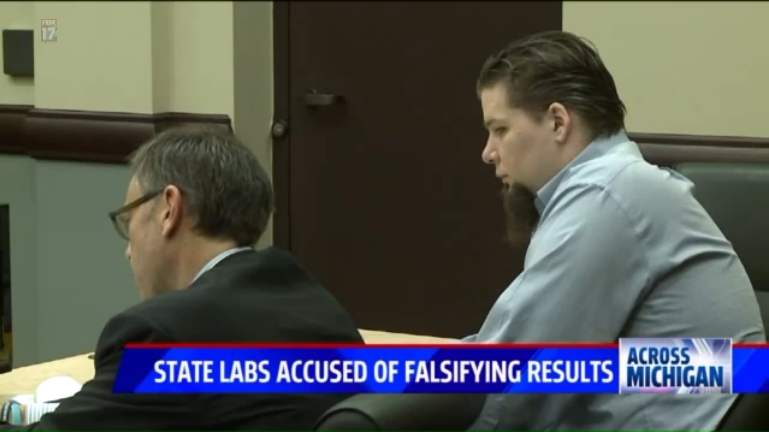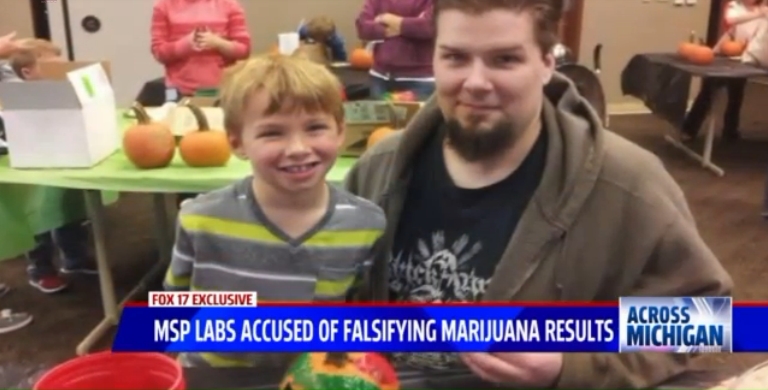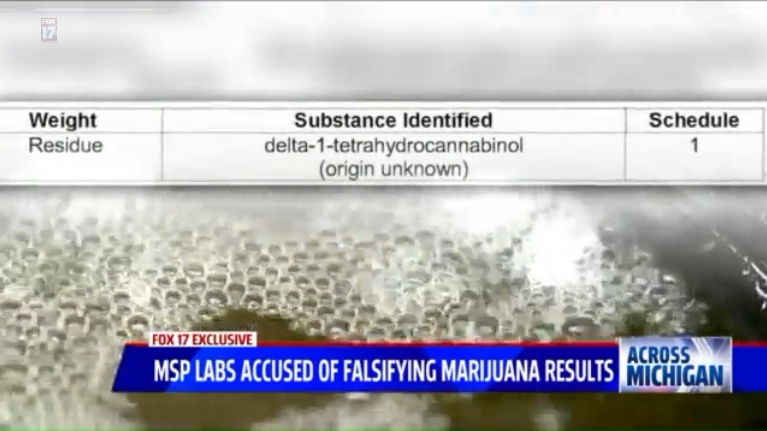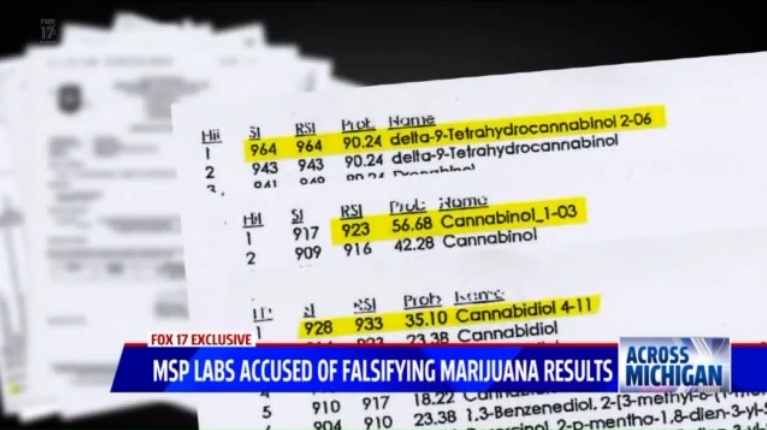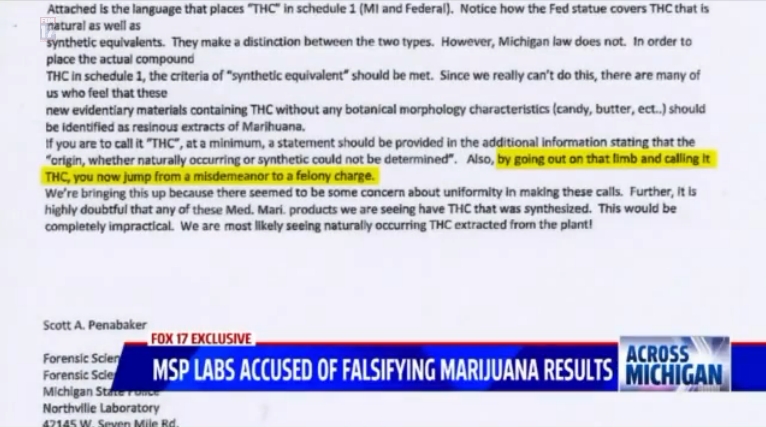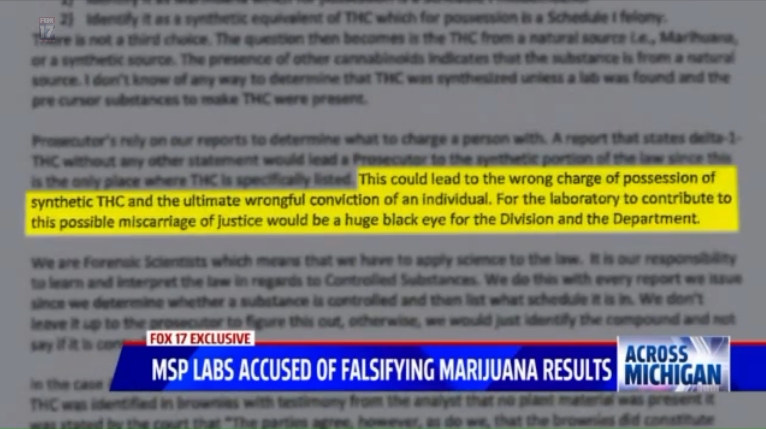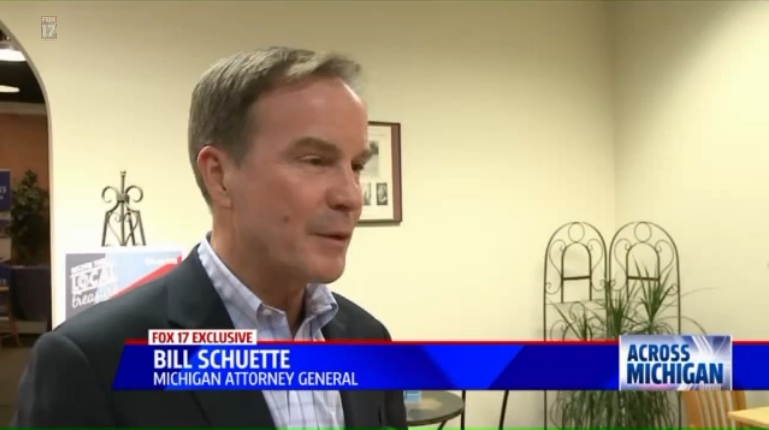
Dec 22, 2015 | Blog, Criminal Defense Attorney Michael Komorn, Medical Marijuana, Medical Marijuana Attorney Michael Komorn, Michigan Medical Marijuana Act, News
In 2008, an overwhelming majority of Michigan voters approved legislation to legalize marijuana for medical use in the state.
With nearly 50,000 Michigan residents arrested and incarcerated each year for controlled substance violations, the state’s prison industrial complex was expected to a financial hit after the legalization of medical marijuana.
As enacted by 63 percent of Michigan voters, the Medical Marijuana Act directed police to stop wasting the state’s limited financial resources on arresting and locking up sick people for smoking pot.
But Michigan cops had a better idea. In October, police quietly changed a policy on how marijuana is tested at the state crime labs. The new policy allows medical marijuana users to be falsely charged with felony possession of a controlled substance.
While medical marijuana that is obtained from a marijuana plant can be legally obtained and used by patients who have a doctor’s prescription in Michigan, it is illegal for anyone to possess or use synthetic marijuana in the state.
As reported by Michigan Radio, the new state crime lab policy allows legal marijuana users to be charged with a crime they did not commit. The new policy,
“instructs crime labs to treat extracts that contain THC as being synthetic. That’s if it is not absolutely clear they came from a cannabis plant. That opens people to felony charges as opposed to misdemeanors.”
The new policy clearly puts the burden of proof on the accused, rather than on the state. It also directs the crime lab to operate under an unconstitutional assumption of guilt.
Internal documents obtained through a freedom of information request show that some crime lab technicians vehemently opposed the changes. Among those who protested the changes from inside the agency was Lansing Crime Lab Controlled Substances Unit Supervisor Bradley Choate.
Choate wrote in an email to colleagues,
“This could lead to the wrong charge of possession of synthetic THC and the ultimate wrongful conviction of an individual. For the laboratory to contribute to this possible miscarriage of justice would be a huge black eye for the Division and the Department.”
According to Komorn Law Office Attorney, Jeff Frazier, who is currently representing a man wrongfully charged with possession of synthetic marijuana under the new policy,
“The Michigan state crime lab systematically is reporting false results, the prosecutors then can go charge people with felonies they didn’t commit. In fact, that’s what they’re doing.”
Frazier went on to say that the new policy “contaminates and taints the very reliability and credibility of the police lab.”
Charmie Gholson, founder of Michigan Moms United, a medical marijuana advocacy group, told Michigan Radio,
“Michigan taxpayers are paying for these trumped up charges. They’re paying for the investigations. They’re paying for the prosecutions of Michigan families with no criminal intent who believed that the state was going to protect them.”
The new policy clearly violates the United States Constitution which protects the rights of the accused, and places the burden of proof on the state.
Should we surprised by that? The multi-billion dollar for profit prison industry peddles its influence through every level of government. It’s an industry that thrives off the incarceration of other human beings. According to the tenants of the corporate Bible, otherwise known as the Friedman Doctrine, the only ethical responsibility any corporation has is to ensure that its shareholders do not lose money.
Police and public officials no longer work for the people. Our tax dollars may pay their salaries, but their job is not to serve and protect us. Their job is to keep the private prisons full of young, able-bodied workers. Whether the people they arrest and incarcerate are guilty or innocent is of no consequence to them whatsoever.
Original Post
Author: Randa Morris December 12, 2015 10:18 am

Dec 10, 2015 | Blog, Marijuana Criminal Defense Attorney Michael Komorn, Medical Marijuana, Medical Marijuana Attorney Michael Komorn, Michigan Medical Marijuana Act, News
THE MICHIGAN STATE POLICE Forensic Science Division finds itself embroiled in scandal as newly released emails paint a picture of a crime lab in turmoil over how to classify marijuana. Attorneys and medical marijuana advocates accuse Michigan prosecutors of pressuring the state’s crime lab to falsely classify the origins of THC found in hash oils and marijuana edibles as “origin unknown.”
Prosecutors exploited the ambiguity to charge medical marijuana users for possession of synthetic THC, despite the fact that the personal use of medical marijuana has been legal in Michigan since it was approved by voters in 2008. Under Michigan law, possession of synthetic THC constitutes a felony, whereas possession of marijuana and its derivatives by someone who is not a licensed medical marijuana user is a misdemeanor.
The emails were obtained by Michael Komorn, lead lawyer for Max Lorincz, a medical marijuana patient who lost custody of his child and now faces felony charges after the lab’s misleading classification of hash oil found in his home.
“I’d never seen a lab report reporting origin unknown,” Komorn told The Intercept. “What was produced for us was the most unbelievable set of documents I’ve ever seen.”
The emails show that as Michigan forensic scientists debated how to classify oil and wax produced from marijuana plants, they were pressured by police and prosecutors to classify the products in a way that would facilitate harsher drug convictions.
“It is highly doubtful,” a forensic scientist named Scott Penabaker wrote in May 2013, “that any of these Med. Mari. products we are seeing have THC that was synthesized. This would be completely impractical.” And in February 2014, the supervisor of Lansing, Michigan’s controlled substances unit, Bradley Choate, wrote that a misleading identification of THC “could lead to the wrong charge of possession of synthetic THC and the ultimate wrongful conviction of an individual.” Lab inspector John Bowen, referring to the THC in edibles and oils, agreed: “Is it likely that someone went to the trouble to manufacture THC and two other cannabinoids, mix them up, and bake them into a pan of brownies? Of course not.”
Despite the unlikelihood that Lorincz and others were somehow cooking up synthetic THC, Andy Fias, a state police lieutenant with West Michigan’s regional drug task force, reached out to the Forensic Science Division in January 2015. “We are encountering a significant amount of THC wax and oil,” he wrote. “If we were to seized [sic] the wax/oil from a card carrying patient or caregiver and it comes back as marijuana, we will not have PC [probable cause] for the arrests.”
Fias had heard that lab analysts were classifying some oil as marijuana rather than THC. He asked: “Is there a way to get this changed? Our prosecutors are willing to argue that one speck of marijuana does not turn the larger quantity of oil/wax into marijuana.”
That aggressive — and intellectually dishonest — prosecutorial mindset explains what happened to Lorincz last year.
On September 24, 2014, Lorincz called 911 from his Spring Lake, Michigan, home when his wife experienced an emergency. “The paramedics came in to assist my wife, and while they were assisting my wife the sheriff came in from the outside,” the 35-year-old father told me. It was then that the officer discovered hash oil on the kitchen counter. “The whole thing is ridiculous,” said Lorincz, who at the time possessed a Michigan medical marijuana card. “I didn’t commit any crime.”
Authorities didn’t see it that way.
The Ottawa County Prosecuting Attorney’s office, led by Ronald Frantz, charged Lorincz with misdemeanor marijuana possession. Instead of pleading guilty, he fought the charge on the grounds that his medical marijuana card allowed him to legally possess the hash. Prosecutors responded in February by charging Lorincz with possession of synthetic THC, a felony.
Because the crime lab claimed to be unable to determine the origin of the THC in the hash oil, prosecutors were able to allege that Lorincz’s oil was not made from marijuana.
Jeff Frazier, a former ACLU attorney who is also working on Lorincz’s case, accuses the state’s prosecutors of circumventing the medical marijuana law passed in 2008 because of their intense opposition to marijuana.
“The lab is intentionally reporting nonexistent felonies,” said Frazier, “and the prosecutors are going after medical marijuana patients with these lab reports that are fraudulent.”
Activists believe that Michigan Attorney General Bill Schuette may be behind the pressure on the crime lab. In 2008 Schuette led the opposition to the successful initiative. “He’s been opposed to medical marijuana since the get-go and has used his office to circumvent the law,” said Charmie Gholson, a drug policy reform advocate based in Michigan.
Gregoire Michaud, director of Michigan’s Forensic Science Division, wrote in a July 2013 email that “In my meeting with PAAM [Prosecuting Attorneys Association of Michigan] it was decided that any questions regarding law interpretation (e.g., recent controlled substance cases) will be directed thru the applicable Technical Director who will then reach out to Mr. Ken Stecker.”
Kenneth Stecker, an official with PAAM, stridently opposes medical marijuana usage and in a 2012 speech said, “I literally every night look at websites, blogs, everything for two to three hours dealing with the medical marijuana issue.” At the time, Stecker said that he had given “over 150, 200 presentations” on the “hornet’s nest” of medical marijuana.
A December 2013 email quotes Stecker as saying, “THC is a schedule 1 drug regardless of where it comes from.” He neglected to mention that penalties for possession very much depend on where it comes from.
John Collins, a former director of the Forensic Science Division, told Fox 17 television, which first reported Lorincz’s case earlier this year, that prosecutors were playing politics with science. “In my experience, it was just a nonstop political game that really got frustrating, and it wore down the morale of our staff, and it quite honestly, it wore me down.”
“It was really a big deal for me to let people understand that our laboratories were not in the prosecution business, they’re not in the conviction business, they’re in the science business,” Collins told Fox 17. “And if we don’t position ourselves as being in the science business, then we really start to go down a path that’s going to lead us to a lot of trouble.”
The Michigan State Police provided the following statement:
The ultimate decision on what to charge an individual with rests with the prosecutor. The role of the laboratory is to determine whether marihuana or THC are present. Michigan State Police laboratory policy was changed to include the statement “origin unknown” when it is not possible to determine if THC originates from a plant (marihuana) or synthetic means. This change makes it clear that the source of the THC should not be assumed from the lab results.
Bill Schuette and Ronald Frantz did not respond to requests for comment. Kenneth Stecker declined to comment.
Meanwhile, Max Lorincz’s life remains in limbo, and his 6-year-old son is in foster care. Currently, he gets a few hours per week of visitation, but father and son have been apart for over a year now.
“It’s been the worst year of me and my wife’s life,” Lorincz said. “You’re talking about taking away an entire year of bonding with our son. It’s something we can never get back.”
This isn’t the first time conviction-hungry Michigan prosecutors have destroyed the lives of medical marijuana users.
In 2014, prosecutors charged Kent County sheriff’s sergeant Timothy Bernhardt with running a drug house because he received and distributed marijuana butter. Bernhardt was a licensed medical marijuana patient but not a licensed caregiver and thus was not permitted to distribute the drug to other users.
In a lab report from Bernhardt’s case, the crime lab classified Bernhardt’s marijuana butter as THC and investigators claimed to be unable to identify its origin. Armed with that report, prosecutors in Kent County went after Bernhardt with full force. Bernhardt eventually pleaded guilty to the drug house charge and was forced to resign after 22 years with the department, even though the butter was being used for medical purposes. He faced up to two years in prison, but a month before the sentencing hearing he killed himself.
“They killed him,” said Gholson. “They have blood on their hands.”
Just days before Bernhardt’s suicide, a Kent County prosecutor named Tim McMorrow told a state court that Michigan voters, despite their overwhelming approval of medical marijuana, do not have the final say. “The voters do not have a right to adopt anything they want,” McMorrrow said. “Something doesn’t become valid because the voters voted for it.”
Article By – Juan Thompson – Nov. 14 2015, 8:43 a.m.
Wikipedia
https://en.wikipedia.org/wiki/The_Intercept
The Intercept is an online publication launched in February 2014 by First Look Media, the news organization created and funded by eBay founder Pierre Omidyar.[2]
Glenn Greenwald, Laura Poitras, and Jeremy Scahill are the editors. The magazine serves as a platform to report on the documents released by Edward Snowden in the short term, and to “produce fearless, adversarial journalism across a wide range of issues” in the long term
“A primary function of The Intercept is to insist upon and defend our press freedoms from those who wish to infringe them. We are determined to move forward with what we believe is essential reporting in the public interest and with a commitment to the ideal that a truly free and independent press is a vital component of any healthy democratic society. […] Our focus in this very initial stage will be overwhelmingly on the NSA story. We will use all forms of digital media for our reporting. We will publish original source documents on which our reporting is based. We will have reporters in Washington covering reactions to these revelations and the ongoing reform efforts. We will provide commentary from our journalists, including the return of Glenn Greenwald’s regular column. We will engage with our readers in the comment section. We will host outside experts to write op-eds and contribute news items.
Our longer-term mission is to provide aggressive and independent adversarial journalism across a wide range of issues, from secrecy, criminal and civil justice abuses and civil liberties violations to media conduct, societal inequality and all forms of financial and political corruption. The editorial independence of our journalists will be guaranteed, and they will be encouraged to pursue their journalistic passion, areas of interest, and unique voices.
We believe the prime value of journalism is that it imposes transparency, and thus accountability, on those who wield the greatest governmental and corporate power. Our journalists will be not only permitted, but encouraged, to pursue stories without regard to whom they might alienate.”

Nov 24, 2015 | Blog, Komorn Law Blog, Medical Marijuana Attorney Michael Komorn, Michigan Medical Marijuana Act, Michigan Medical Marijuana Criminal Defense, News
On Tuesday, November 10th, the Warren City Council held a public hearing regarding a proposed medical marijuana ordinance being championed by Mayor Jim Fouts. Fouts claims the ordinance is in response to concerns about growing medical marijuana in residential areas, including a house explosion on Harold street on September 28th that was reportedly due to butane hash oil extraction being performed inside of the home.
The Warren ordinance seeks to:
• Prohibit the consumption of marihuana in any area of any property open to the public or in a non-public area of a property where the owner has prohibited it
• Prohibit the transfer of marihuana at a caregiver’s residential dwelling
• Prohibit the odor of marihuana from being emitted beyond the interior of a structure
• Demands ventilation, filtration, and exhaust equipment to control the odor of marihuana
• Prohibits the growing, manufacturing, or processing of marihuana by a caregiver outside of an M-1 or M-2 industrial district. A qualifying patient may grow marihuana in their home, but only after registering and submitting a plan with the city’s building department and allowing inspections by both the building and fire departments
• Demands that, if a fire occurs as a result of the growth, cultivation, or processing of medical marihuana, that the qualifying patient be responsible for all emergency response costs or injuries which result
• Demands that when medical marihuana is transported inside of a motor vehicle, that it only be done in a sealed and locked container which is not readily accessible from the interior of the vehicle.
Violation of the proposed ordinance would be misdemeanors.
During public testimony, Southfield attorney Michael Komorn said, “There is an old saying for lawyers: When you don’t have the facts, argue the law, and when you don’t have the law, argue the facts.” Komorn went on to say, “After reading these proposed amendments, I can tell they have neither.”
Attorney after attorney echoed Komorn’s sentiment, stating the proposed ordinance was unconstitutional and in direct conflict with the Michigan Medical Marihuana Act as well the Supreme Court opinion issued in Ter Beek v City of Wyoming.
In addition, several residents also testified about how they would be negatively affected should the ordinance pass.
After enduring 2 hours of public testimony, of which none was in support of the ordinance, Council President Cecil St Pierre stated that the Council had “received an education” regarding the proposed ordinance and a motion was passed to table the first reading of the ordinance for further discussion by the committee of the whol
e. Several Council members, including Council Secretary Scott Stevens, pressed to have a motion to deny heard – a vote, however, never materialized. It is expected that a revised ordinance will appear on the Council’s agenda sometime in the next several months.

Nov 18, 2015 | Blog, Medical Marijuana Attorney Michael Komorn, Michigan Medical Marijuana Act, News
GRAND RAPIDS, Mich. – Big questions are still looming over the controversial Michigan State Police Forensic Science Division marijuana reporting policy change: it’s accused of ambiguous crime lab reporting leading to misdemeanor pot charges trumped for synthetic-THC felonies.
Tuesday MSP-FSD officials responded to FOX 17’s investigation: officials stated they stand by their policy change, but they failed to address some of our biggest questions.
Last month, FOX 17 was the first to show you emails accusing the crime labs of falsely reporting marijuana extracts, leading to trumped up felony charges of synthetic pot possession. Tuesday, state police officials released a seven-paragraph statement which explains their 2013 policy change to write “origin unknown” on lab reports where they said they cannot determine if samples are marijuana or man-made THC (mainly in the case where pot plant material is not present).
However, their statement does not address the concerns FOX 17 revealed in uncovered emails from MSP-FSD’s own crime lab employees who wrote to their peers that they do have the science to prove where pot extracts, like edibles and hash, come from.
Here is the MSP statement in full released to FOX 17 on Nov. 17:
“In 2013, the Michigan State Police Forensic Science Division (MSP-FSD) changed its policy regarding how marihuana and THC are reported in an effort to standardize reporting practices among our laboratories and to ensure laboratory reports only include findings that can be proved scientifically.
With the influx of synthetic drugs into our laboratory system it became necessary to ensure reporting standards were in place across all labs. As is common practice in this division, involved laboratory managers were given the opportunity to discuss the proposed changes and provide their insight before a final decision was made by laboratory command.
After this discussion period, the decision was made to begin using the phrase “origin unknown” for samples in which it is not possible to determine if THC originates from a plant (marihuana) or synthetic means. It should be pointed out that “origin unknown” does not mean the sample is synthetic THC; it only means the lab did not determine the origin and the source of the THC should not be assumed from the lab results.
For example, if a sample is submitted to the lab that is clearly from a plant-based source, the results will indicate the sample is marihuana. If it is not clear that the submitted sample is from a plant-based source because it is an extract, residue or another compound with no visible plant matter, then the report will indicate whether or not THC — the illegal component of the sample — is present, but the source of the THC will not be identified (“origin unknown”) because the source cannot be scientifically established.
This reporting procedure was further clarified in July 2015 with the amended phrase of “The origin of delta-1-tetrahydrocannabinol may be from a plant (marihuana) or a synthetic source.”
The MSP-FSD takes full responsibility for this policy change and stands behind its decision, as being in the best interest of science. The allegation that politics or other influence played a role in this policy change is wholly untrue.
As is the circumstance in all criminal cases, the ultimate charging decision rests with the prosecuting authority that makes their decision based upon all the relevant evidence in a case, of which the laboratory report is but one factor.”
Note that in the first paragraph, state police officials write that their 2013 marijuana and THC reporting change was made in an effort to “standardize reporting practices among our laboratories and to ensure laboratory reports only include findings that can be proved scientifically.”
Officials explain that the crime lab was testing an influx of synthetic drugs. Then, as FOX 17 has been reporting, after a discussion, MSP officials changed policy to write “origin unknown” on lab reports for samples officials said are impossible for their lab employees to determine where the THC originates.
Yet again, writing “origin unknown” on lab reports is a resonating point of contention, attorney Michael Komorn, medical marijuana activists, and even crime lab scientists themselves disagree. This is even evidenced within months of uncovered email chains between MSP-FSD employees where crime lab scientists and directors wrote they can prove where marijuana extracts come from based on science and tests available in the crime labs.
But MSP’s argument appears to remain that because there is no pot plant visible in samples like hash and edibles, their labs cannot determine if the THC is natural or man-made: again, the difference between a misdemeanor and felony.
Ultimately MSP officials wrote, “MSP-FSD takes full responsibility for this policy change and stands behind its decision, as being in the best interest of science.”
As of Tuesday, MSP officials decline on-camera interviews with FOX 17, including an interview with MSP-FSD Director, Captain Greg Michaud.
Although it is up to the prosecutor to file charges, this crime lab reporting change has severely affected people’s lives, including the father in Spring Lake Max Lorincz who is charged with felony possession of synthetic-THC for having butane hash oil.
Lorincz has lost custody of his son since September 2014 as a result, and he is due back in Ottawa County Court Friday. Lorincz and his family have started a GoFundMe page to raise money to continue fighting their case and comply with court’s orders: including money for transportation to drive to drug tests and counseling all because he is a medical marijuana card-carrying patient.
Stay with FOX 17 for the latest on this investigation.
POSTED 6:03 PM, NOVEMBER 17, 2015, BY DANA CHICKLAS

Nov 7, 2015 | Blog, Criminal Defense Attorney Michael Komorn, Medical Marijuana, Medical Marijuana Attorney Michael Komorn, News
GRAND RAPIDS, Mich. – First on FOX 17, we broke serious allegations that state police crime labs are being told to falsely report marijuana test results. This is resulting in misleading lab reports that an attorney claims creates felonies without real proof.
Attorney Michael Komorn believes a recent policy change in the way Michigan State Police forensic science crime labs report marijuana may have led to years of wrongful convictions.
Komorn called this a “perversion of science,” and “crime labs turned crime factories:” accusations that politics are trumping forensic science by escalating misdemeanor marijuana charges into felonies without proof.
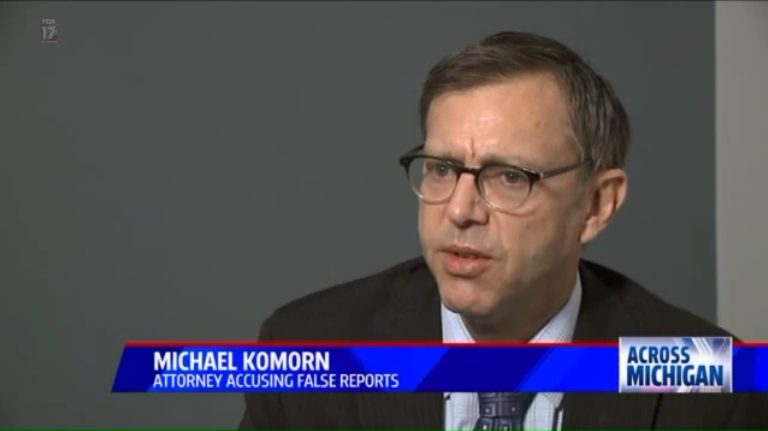
It’s torn one Spring Lake family to pieces: a 6-year-old son taken away from his parents 14 months ago, in part, because of a disputed felony.
Since September of last year, Max Lorincz has been cheated of carefree moments with his son, Dante. Afternoons of uninterrupted fun have morphed into supervised visits.

“The doctor is telling me one thing, the judge is telling me another,” said Lorincz. A card-carrying medical marijuana patient, Lorincz is caught between doctor’s orders and a judge.
For years he has been ingesting marijuana oils for serious stomach issues and pain after a debilitating back injury. Last year, during an unrelated emergency, a cop walked into his home finding a “smudge” of butane hash oil.
His medicine got him in trouble, and he was charged with a misdemeanor for having marijuana. But he has a medical marijuana card, which should protect him for having what’s called “usable marijuana,” under the Michigan Medical Marijuana Act.
So the charges could have been dropped, but that is not what happened.
The Ottawa County Prosecutor charged Lorincz for having a schedule 1 synthetic drug; that is no longer a misdemeanor, it is a two-year felony. Komorn calls it a “bogus crime.”
“When you have a laboratory that is looking at a substance and reporting it in a way that makes it a schedule 1 instead of the marijuana they know it is, it’s creating a crime,” said Komorn.

What Lorincz had is a marijuana extract: butane hash oil, made by filtering butane through the plant, extracting the cannabinoids, or chemicals unique to marijuana, namely THC, the plant’s most psychoactive ingredient.
The certificate of analysis of Lorincz’s MSP crime lab report includes the phrase, “origin unknown.”
“In this particular case a quantitation was not done, and therefore I could not conclude whether or not it was hemp, you’re correct,” said William Ruhf, the MSP forensic scientist who completed Lorincz’s lap report.
Ruhf wrote this lab report, and then testified in April that he could not determine if this hash oil was natural or man-made. Again, this is the difference between a misdemeanor and a two-year felony.
Jay Siegel, a chemist with a PhD and the former MSU Forensic Science Director, disagrees. “Yes, this is a preparation of marijuana. It was extracted from marijuana,” Siegel said. Siegel told FOX 17 Lorincz’s sample, based upon the lab report, is natural marijuana.
He pointed out in this lab report’s data several tell-tale signs of the natural plant: a brown color, and several cannabinoids, including cannabidiol, cannabinol, and THC. He said it is unreasonable to say this is man-made.
“It’s much easier to get marijuana and extract it; the syntheses are quite sophisticated,” said Siegel.
Then, why are state police forensic scientists writing “origin unknown” on reports like this?
“The substance that we’re talking about has always known and been reported as from the lab as being marijuana, they know it,” said Komorn. “The lab is being forced, compelled, the policy changed to do this a certain way, to report this as a synthetic THC.”

“They also know that by reporting it as synthetic THC, they are stating that they can prove that it came from a synthetic source, as opposed to a natural plant source. This is a lie,” said Komorn.
Komorn said this is the result of a recent MSP Forensic Science policy change, which is not based in science. He obtained months of emails between 2013 and the present through the Freedom of Information Act.
They expose a lengthy debate among MSP forensic scientists, directors, and prosecutors associated with the Attorney General’s office, all regarding a specific procedural change for marijuana lab reports after 2013.
“The law enforcement community is focused on criminalizing medical marijuana patients, creating crimes in a crime laboratory that gives them no integrity,” said Komorn.
First, a crime lab technical leader wrote, “although THC found in foodstuffs and oils is most likely a marijuana extract… our scientists cannot determine if it’s marijuana without seeing any plant material.”
But, Siegel and Komorn already said this is not true.
Emails show after meeting with the Prosecuting Attorneys Association of Michigan (PAAM), a lab leader turns one prosecutor’s opinion into policy.
“That is my opinion, THC is a schedule 1 drug regardless of where it comes from,” Ken Stecker, a prosecutor who works with the Prosecuting Attorneys Association of Michigan (PAAM), which is affiliated with the Attorney General’s office, wrote in an email.
But, according to the law, where THC comes from does make a difference.
“The most damning evidence is that their own forensic scientists calls them out that they can’t do it based on forensic science, and yet they do it anyways,” Kormon said.

MSP forensic scientist Scott Penabaker wrote his concern to colleagues: “By going out on that limb and calling it THC, you jump from a misdemeanor to a felony.” He goes onto write, it is “highly doubtful any of these medical marijuana products we’re testing are synthetic.. That’s completely impractical.”
Then, controlled substances unit supervisor Bradley Choate wrote his heated opposition, including that identifying THC gives scientists two choices: one, marijuana possession as a misdemeanor; or two, synthetic THC possession, a felony; he wrote there is not a third choice.
But if lab reporting goes on like this, Choate wrote: “This could lead to the wrong charge of possession of synthetic THC and the ultimate wrongful conviction of an individual. For the lab to continue this possible miscarriage of justice would be a huge black eye for the division and the department.”

“You don’t just call up the Attorney General’s office and ask them what they think because they’re not scientists,” said Former Director of MSP Forensic Science John Collins. Collins served as the director of MSP Forensic Science from 2010 until he said he surprised the department with his resignation in 2012 in part, because of these issues.
“In my experience, it was just a nonstop political game,” said Collins. Collins reviewed documents in Lorincz’s case, including another email chain from Choate to the department citing their professional training materials.
Choate wrote that their conclusions are based on the evidence, not on political pressure, or other outside influences. Then he wrote, “whether or not an individual has a medical marijuana card is immaterial to how we report out our results.”
This was in response to another email, from MSP lab director Jim Pierson who wrote that lab tests from THC waxes and oils are coming back as marijuana, so they cannot arrest people. Then Pierson wrote, “Is there a way to get this changed? Our prosecutors are willing to argue that one speck of marijuana does not turn the larger quantity of oil/wax into marijuana.”
“Any time that scientists, or administrators of scientific operations, if they would intentionally try to create ambiguity to create a political advantage is beyond unacceptable,” said Collins.
When FOX 17 reviewed some emails obtained through FOIA with Collins he said, “That doesn’t surprise me.”
Michigan State Police Public Affairs and the Prosecuting Attorneys Association of Michigan’s president responded to FOX 17, deferring to each other.
State police public affairs said, it is up to the prosecutors to charge crimes, and lab policy was changed to add the statement “origin unknown” when it’s not possible to determine if THC comes for marijuana or is synthetic.”
Then the PAAM president wrote, it is up to the crime labs to report science. Quote, “any accusation that the lab and PAAM are directing lab personnel to report crimes without evidence is untrue.”
Komorn doesn’t buy it. “There is some wrongdoing going on, that they know that it’s wrong, and they continue to do it otherwise,” said Komorn.
And Siegel, who is also a former professor of many of these MSP employees, urges them to uphold the integrity of science. “What I would say to these people is get yourselves together,” said Siegel. “Get them all together to agree that this is bad science.”
Meanwhile, Lorincz is only allowed to visit Dante twice per week. He said he will not stop fighting for custody, and for the right to use the medicine he says does not hurt his body like pharmaceuticals.
“If nobody stands up for this and it just keeps going the way it is, how many more people are going to get thrown under the bus just for using their prescribed medicine? It’s just ridiculous,” said Lorincz.
Thursday evening FOX 17 caught up with Attorney General Bill Schuette at another event. When FOX 17 asked specifically about these emails that suggest prosecutors within his office are manipulating the way crime labs are reporting marijuana, and what his involvement is, Schuette answered:

“We’re in the middle of an investigation so I really don’t, I can’t comment one way or the other. But, we have an outstanding group of people that work very hard to make sure we enforce the law and defend the Constitution of Michigan.”
Schuette also told FOX 17 his office is “always very open, very transparent, and we have a great group of lawyers who work very hard for the citizens of Michigan.”
An evidentiary hearing for Lorincz’s case was originally set for Nov. 5, but it was adjourned. The Ottawa County Prosecutor filed a motion suppressing the defense’s subpoenas for 13 people, many of whom are quoted from the emails in question.
The defense told FOX 17 they plan to re-file motions and set another hearing likely in December. At this point, it may be up to another court to address the underlying allegations outside of Lorincz’s case.
Meanwhile, there is pending marijuana legislation statewide that would expand the definition of “usable marijuana,” according to the Michigan Medical Marijuana Act, to include concentrates and extracts; for example, House Bill 4210. This would explicitly protect people like Lorincz from charges.
See the Reports
See the News Report

Nov 6, 2015 | Blog, Criminal Defense Attorney Michael Komorn, Medical Marijuana, Medical Marijuana Attorney Michael Komorn, News
A Southfield lawyer alleges the Michigan State Police crime labs have “falsified lab reports on marijuana statewide” and he’s asking a judge to dismisses charges lodged against a client.
Michael Komorn, who also represents defendants in Livingston County, said his office’s discovery stems from Ottawa County resident Maxwell Lorincz, who was initially charged with a misdemeanor possession of marijuana. The Ottawa County prosecutor’s office increased the charge to a felony when Lorincz declined to plead guilty, Komorn said.
“The extensive emails and documents we received through the Freedom of Information Act show the prosecution are relying on the lab to report these substances so that they can escalate these crimes from misdemeanors to felonies,” the defense attorney said.
Tiffany Brown, a spokeswoman with the state police, said the crime lab’s role is to “determine whether marijuana or THC are present in a sample.” The department’s policy changed to include the statement “origin unknown,” she noted, “when it is not possible to determine if THC originates from a (marijuana) plant or synthetic means.”
“This change makes it clear that the source of the THC should not be assumed from the lab results,” Brown said in an email response to an inquiry for comment. “The ultimate decision on what to charge an individual with is determined by the prosecutor.”
A message to Karen Miedema, an assistant prosecutor with Ottawa County, was not immediately returned Wednesday.
As a result, Komorn is asking a judge to dismiss the case against Lorincz and to hold the parties, including the prosecutor, in contempt of court. The hearing was scheduled for next week in Ottawa County Circuit Court in Grand Haven; however, it was put on hold until December following a conference between prosecutors, the defense and the judge.
Komorn’s client was first charged with misdemeanor possession of marijuana, but the charge was increased to a felony alleging he had synthetic THC.
The charge resulted when an officer reporting seeing a small amount of hash oil in Lorincz’s Spring Lake home when he responded to his 911 call for medical assistance for his wife in September 2014.
Komorn says the state police’s policy change began in 2013 when Ken Stecker of the Prosecuting Attorneys Association of Michigan and state attorney general’s office “instructed the lab” it could report marijuana edibles and oils as Schedule 1 synthetic THC, which is a felony.
“This was counter to both law and science as plant-based edibles and oils are categorized as marijuana under Michigan law and their possession punished as a misdemeanor,” Komorn said.
Komorn’s office used FOIA to obtain numerous emails regarding the issue. Among those emails was one from Kyle Hoskins, a state police crime lab supervisor who said examiners needed to see plant material because they would have no idea how it was produced unless they watched its production. He sought Stecker’s opinion, who reportedly responded: “That is my opinion, THC is a Schedule 1 drug regardless of where it comes from. I hope that helps. Ken.”

Marijuana is a Schedule 2 drug under state law.For the second time, the case against a Lansing man involving the state’s medical marijuana law has been dismissed.
See the Michigan Drug Schedule Laws below
Michigan Schedule 1 Drugs mcl-333-7212 Law – Link
Michigan Schedule 2 Drugs mcl-333-7214 – Link
Among the emails Komorn received were some from state police crime lab workers raising concern about the way they were told to report THC cases.
In one email, a forensic scientist notes that to “place the actual compound THC in Schedule 1 (drugs), the criteria of ‘synthetic equivalent’ should be met.”
“Since we really can’t do this, there are many of us who feel that these new evidentiary materials containing THC without any botanical morphology characteristics … should be identified as resinous extracts of marijuana,” the forensic scientist wrote.
The writer goes on to note that misdemeanors can jump to a felony charge and the topic is being brought up “because there seemed to be some concern about uniformity in making these calls. Further, it is highly doubtful that any of these (medical marijuana) products we are seeing have THC that was synthesized.”
Komorn’s office said the “statewide lab scandal” comes on the heels of a report that statewide marijuana arrests are on the rise.
See the exhibits – Link
Between 2008 — when Michigan passed the Medical Marijuana Act — and 2014, arrests for marijuana possession or use increased 17 percent statewide while arrests for all crimes dropped by 15 percent, according to statistics.
Charmie Gholson, founder of Michigan Moms United, said Komorn’s case clearly shows that Michigan’s top prosecutors and law enforcers “conspired to commit crimes against Michigan families.”
“There’s a strategy,” she said. “Someone at the top has sent these soldiers to people’s homes. … This proves the top law enforcement has conspired to target families.”
Contact Livingston Daily justice reporter Lisa Roose-Church at 517-552-2846 or lrchurch@gannett.com. Follow her on Twitter @LisaRooseChurch.





